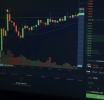The Psychology of Binary Options Trading: How Emotions Impact Your Decisions

The Psychology of Binary Options Trading: How Emotions Impact Your Decisions
Binary options trading is not just about analyzing charts, predicting market movements, or executing strategies—it’s also deeply rooted in psychology. The emotional aspect of trading plays a critical role in decision-making, often determining whether a trader succeeds or fails.
Understanding how emotions influence your actions can help you develop discipline, improve performance, and achieve consistent results. In this article, we’ll explore the psychological challenges of binary options trading and provide actionable tips to manage your emotions effectively.
Understanding how emotions influence your actions can help you develop discipline, improve performance, and achieve consistent results. In this article, we’ll explore the psychological challenges of binary options trading and provide actionable tips to manage your emotions effectively.

The Psychology of Binary Options Trading: How Emotions Impact Your Decisions
1. Why Psychology Matters in Trading
Trading is as much a mental game as it is a technical one. Even the most well-researched strategies can fail if emotions take over. Common psychological pitfalls include:Fear : The fear of losing money can lead to hesitation, missed opportunities, or premature exits from trades.
Greed : Overconfidence after a winning streak may tempt traders to take excessive risks, resulting in significant losses.
Revenge Trading : After a loss, some traders try to "recover" quickly by making impulsive decisions, often leading to further losses.
Overconfidence : Believing you’ve "cracked the code" can cause complacency and poor risk management.
Recognizing these emotional triggers is the first step toward overcoming them.
2. The Role of Fear in Trading
Fear is one of the most common emotions traders face. It manifests in several ways:Fear of Loss : Traders may avoid entering trades altogether, missing out on profitable opportunities.
Fear of Missing Out (FOMO) : Conversely, FOMO can push traders to jump into trades without proper analysis, driven by the desire to capitalize on quick profits.
Fear of Being Wrong : Some traders hold onto losing positions longer than they should, hoping the market will turn in their favor instead of accepting a small loss.
To combat fear:
Stick to your trading plan and rely on data rather than emotions.
Use stop-loss orders to limit potential losses and reduce anxiety.
Focus on long-term results rather than individual trade outcomes.
3. The Impact of Greed
Greed often creeps in after a series of successful trades. Traders may start believing they’re invincible, leading to reckless behavior such as:Increasing position sizes beyond what their strategy allows.
Ignoring risk management principles.
Chasing unrealistic profit targets.
To avoid falling victim to greed:
Set realistic profit goals and stick to them.
Regularly withdraw a portion of your earnings to lock in profits.
Remind yourself that consistency is more important than occasional big wins.
4. Revenge Trading: A Dangerous Cycle
Revenge trading occurs when a trader tries to recover losses by making impulsive, emotionally driven trades. This behavior often leads to even greater losses and a downward spiral. To break this cycle:Take a break after a losing trade to clear your mind.
Analyze the trade objectively to understand what went wrong.
Accept that losses are part of trading and focus on improving your overall strategy.
5. Developing Emotional Discipline
Emotional discipline is the cornerstone of successful trading. Here’s how to cultivate it:Create a Trading Plan : A detailed plan outlines your entry/exit points, risk management rules, and profit targets. Follow it religiously to avoid emotional decision-making.
Practice Patience : Wait for high-probability setups instead of forcing trades. Remember, there’s always another opportunity.
Stay Calm Under Pressure : Use techniques like deep breathing or meditation to maintain composure during volatile market conditions.
Limit Screen Time : Constantly monitoring the markets can increase stress and lead to overtrading. Set specific times for analysis and execution.
6. Cognitive Biases in Trading
Cognitive biases are mental shortcuts that can distort your perception and lead to poor decisions. Common biases include:Confirmation Bias : Seeking information that supports your existing beliefs while ignoring contradictory data.
Anchoring Bias : Relying too heavily on the first piece of information you encounter (e.g., the initial price of an asset).
Loss Aversion : Feeling the pain of losses more intensely than the joy of gains, which can lead to irrational decisions.
To mitigate cognitive biases:
Question your assumptions and seek diverse perspectives.
Keep a trading journal to track your thought processes and identify patterns.
Continuously educate yourself to stay objective and informed.
7. Building a Winning Mindset
A positive mindset is essential for long-term success. Here’s how to cultivate one:Focus on Process Over Results : Instead of obsessing over profits, concentrate on executing your strategy flawlessly.
Celebrate Small Wins : Acknowledge achievements, no matter how minor, to build confidence and motivation.
Learn from Mistakes : Treat losses as learning opportunities rather than failures.
Visualize Success : Imagine yourself achieving your trading goals to reinforce positive thinking.
8. The Importance of Self-Care
Your mental and physical well-being directly impacts your trading performance. Neglecting self-care can lead to fatigue, stress, and poor decision-making. Tips for maintaining balance:Get adequate sleep to ensure clarity and focus.
Exercise regularly to reduce stress and boost energy levels.
Take breaks during trading sessions to recharge.
Avoid trading when you’re emotionally overwhelmed or distracted.
Conclusion
The psychology of binary options trading is a powerful force that can either propel you to success or derail your efforts. By understanding the impact of emotions like fear, greed, and revenge, you can develop the discipline and resilience needed to thrive in the markets. Create a solid trading plan, manage your emotions, and prioritize self-care to maintain a healthy mindset. Remember, trading is not just about numbers—it’s about mastering yourself.
Are you ready to take control of your emotions and elevate your trading game? Start by implementing these psychological strategies today and watch your performance improve.
Psychology of trading, binary options, emotional discipline, fear in trading, greed in trading, revenge trading, cognitive biases, trading mindset, risk management, trading emotions
The psychology of binary options trading is a powerful force that can either propel you to success or derail your efforts. By understanding the impact of emotions like fear, greed, and revenge, you can develop the discipline and resilience needed to thrive in the markets. Create a solid trading plan, manage your emotions, and prioritize self-care to maintain a healthy mindset. Remember, trading is not just about numbers—it’s about mastering yourself.
Are you ready to take control of your emotions and elevate your trading game? Start by implementing these psychological strategies today and watch your performance improve.
Psychology of trading, binary options, emotional discipline, fear in trading, greed in trading, revenge trading, cognitive biases, trading mindset, risk management, trading emotions














Report
My comments